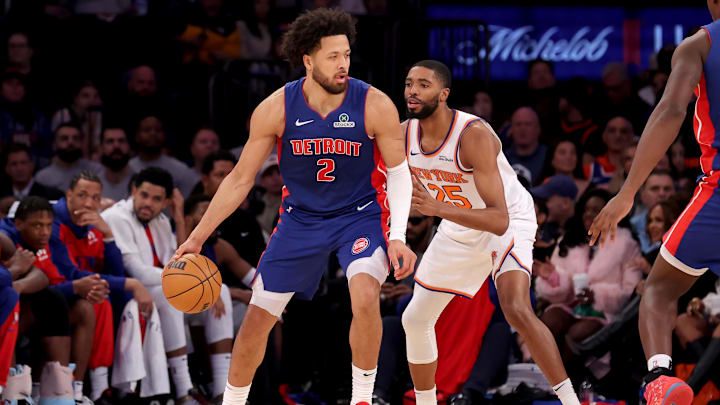The New York Knicks have a problem entering the first round of the 2025 NBA playoffs.
His name is Cade Cunningham.
New York's struggles to guard the Detroit Pistons star are well-documented. Through four matchups against the Knicks this season, Cunningham is averaging 30.8 points and 8.3 assists while banging in 58 percent of his twos and over 56 percent of his threes. That is decidedly not great, and a contributing factor, if not the main reason, New York is just 1-3 against Motor City's finest on the year.
Every first-round series lookahead worth its salt has cast a spotlight onto this player-versus-team matchup, and what the Knicks can do about it. Potential solutions tend to focus on individual head-to-heads.
Mikal Bridges has drawn a lion's share of those defensive looks. Should head coach Tom Thibodeau stick with that setup? Or should OG Anunoby be saddled with pitching in more frequently? And if not him, does Deuce McBride deserve more reps against Cunningham, despite giving up roughly five inches?
Glomming onto the individual assignment is beyond fair. But there is another, possibly bigger issue the Knicks must contend with when attempting to slow down the Association's Most Improved Player favorite.
This part of Cade Cunningham's game is officially underrated
Emphasis on slow down.
It isn't receiving enough attention, even as many loop him into the year-end awards discourse, but Cunningham has materially leveled up his transition instincts. His knack for getting out on the break has never been stronger. He will grab and go immediately after snaring a rebound, but he's also a whiz at positioning himself in the center of the floor to catch outlet passes when someone else boards a miss.
Detroit is fourth in the percentage of its plays that come in transition for the season—and second since January 1. Nobody is driving this open-floor volume more than Cunningham.
The Pistons' fast-break frequency with him on the floor increases by 3.2 percent overall, and it rises by 6.5 percentage points when looking at how often they run following opponent misses. Both of those possession-type differentials are among the seven largest in the entire league among every player who has cleared at least 1,000 minutes.
New York's transition defense can be shaky
Derailing this part of Cunningham's game is not a given for the Knicks. Making shots is, of course, a great start. It gives their defense a chance to get set and latch onto its prescribed assignments.
Still, New York's fast-break prevention isn't always top-notch. It is solid overall, but the Knicks rank in the bottom 10 of opponent transition frequency after they miss a shot on the offensive end.
Their issues on these plays cannot be boiled down to one thing. Perhaps not surprisingly, though, some of their most-used players are the biggest culprits.
Jalen Brunson and Karl-Anthony Towns are among those who can get burned attempting to cross-match—and even when they're not. Opponents spend 32.8 percent of their time in transition overall after a Knicks miss when the starters are on the floor. That is a monster number, and many of the most egregious instances have coincided with Mikal Bridges' worst performances. New York is also generally getting torched in these situations whenever it tries Precious Achiuwa at the 4, as if we needed any more evidence that he has no business being in the playoff rotation.
Can the Knicks actually keep the Pistons out of transition?
Cunningham and the Pistons will absolutely look to exploit this crack in the Knicks' live-ball defense, in no small part because it can help paper over their own offensive struggles in the half-court. And at first glance, unless you want to dismiss this as a "play harder and smarter" issue, New York does not have a magic panacea in its back pocket.
Giving more run to McBride can certainly help. Landry Shamet is also pretty underrated at getting back on live-ball possessions. Tacking on additional Mitchell Robinson minutes should provide some cover. He titrates up the Knicks' offensive rebounding opportunities, giving them extra shakes at scoring and forcing the Pistons to inbound the ball.
There is also a chance that cross-matching actually increases New York's transition engagement. It requires at least an extra iota of forethought, which can make it more of a possession-by-possession priority. Certain offenses can end up slowing themselves down in these instances, too. If New York is plopping Brunson on Tim Hardaway Jr., is it possible Cunningham inadvertently downshifts on the run while trying to suss him out and target him?
This approach might even already be working against the Pistons. The Knicks allowed Detroit to get out on the break 24.8 percent of the time after a miss during the regular season. That is the fourth-smallest share surrendered by the Pistons' opponents, and markedly lower than their average of 32.7 percent.
Does this mean New York's transition defense is better than advertised, or that Detroit isn't as much of a problem as so many make them out to be? Maybe. And even if the answer is yes, it doesn't change the overarching point: If the Knicks want to ensure they avoid first-round disaster, or even just guarantee this series isn't harder than it needs to be, they need to prioritize capping Cunningham's fast-break opportunities.
Dan Favale is a Senior NBA Contributor for FanSided and National NBA Writer for Bleacher Report. Follow him on Bluesky (@danfavale), and subscribe to the Hardwood Knocks podcast, co-hosted by Bleacher Report's Grant Hughes.
